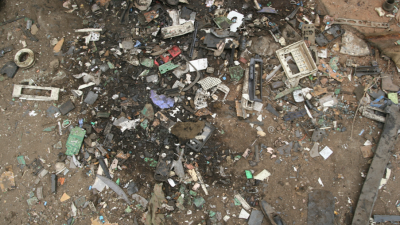
For most of us consumers electronic devices such as smartphones, tablets, notebooks, printers or microwaves are a fundamental and indispensable parts of our daily lives. As a result of rapid growth and constant innovation the electronic industry is the world’s fastest growing industry. The “Internet of things” is increasingly adding electronic devices onto our shopping list. Devices that are adding up to a 24h surveillance system that are tracking every aspect of our life and are containers for private data. The life cycle of these products are considerably short and when they break we do not know how to fix them. When it is cheaper to buy a new one than to repair the old one we move on to a upgraded model. But where do these electronic devices go to die? Some of them end up in regulated e-waste centrals in Europe, yet lot of them are dumped illegally on electronic-wastelands in developing countries where they become a serious environmental threat. A privacy issue is that these devices still contain personal data that can be reanimated and abused when falling into wrong hands. In the ‘Behind the smart world’ – research lab we question what happens to our electronic waste? What environmental and privacy threats exists? And how can we become more responsible users of technology.
In 2014 KairUs visited the biggest e-waste dump in the world, Agbogbloshie in Accra, Ghana. There we bought 22 hard drives. As a hads-on part of this research lab we will try to reanimate the the hard drives and explore what kind of data traces are revealed of their prior owners. We will also make a number of excursions and meet some experts to understand how electronic waste is taken care of in Austria.
In May we will organize a combined symposium and art-lab inviting experts to discuss the thematics of this research lab and to work with other artist to tell the story of the 22 hard drives.
Read more: http://research.radical-openness.org/2015
Organized in collaboration with
KairUs is an artist collaboration platform founded in 2010 by Linda Kronman and Andreas Zingerle. The platform takes interest in Human-Computer and Human-Human Interaction with a focus on media art and interactive storytelling. Through events like workshops, exhibitions, talks, presentations and guided tours KairUs invites people to participate and share opportune moments for art collaborations.
Website: http://www.kairus.org

